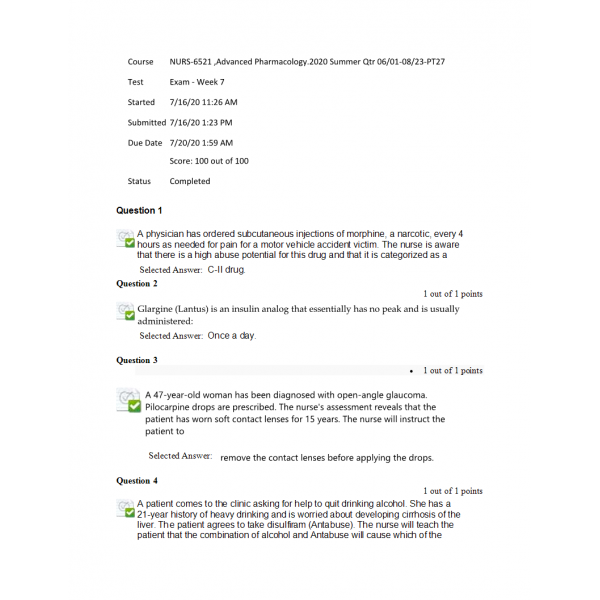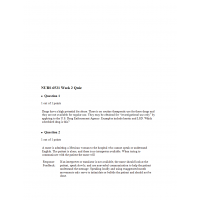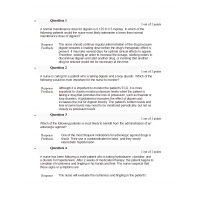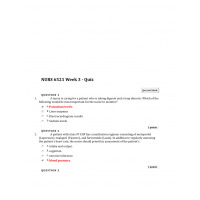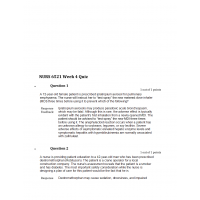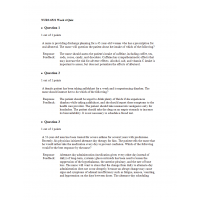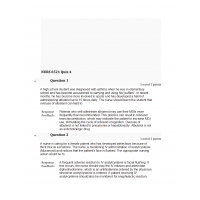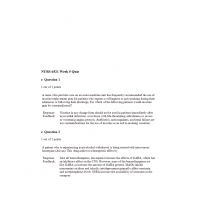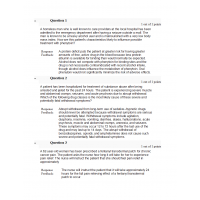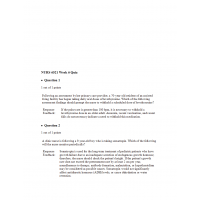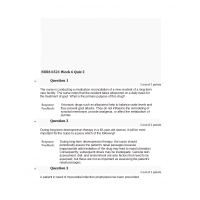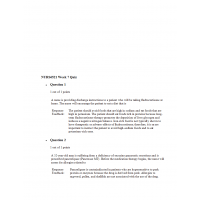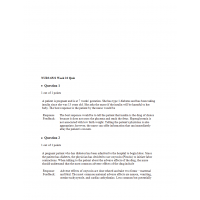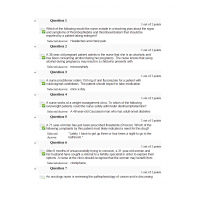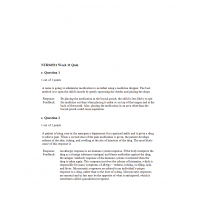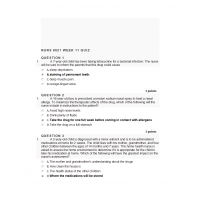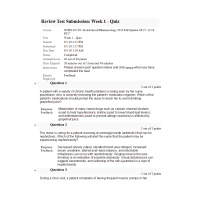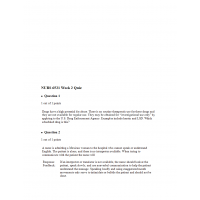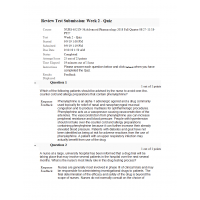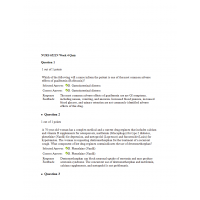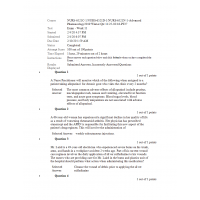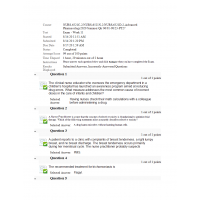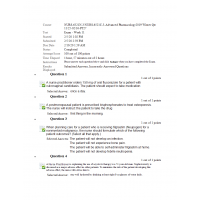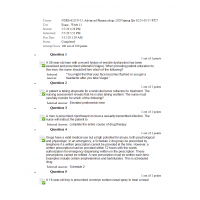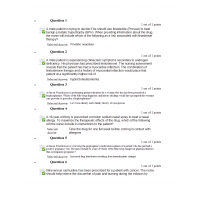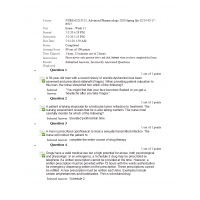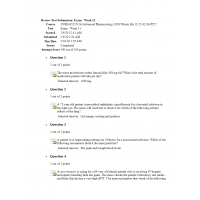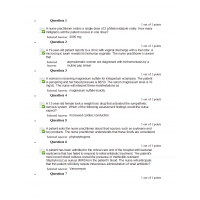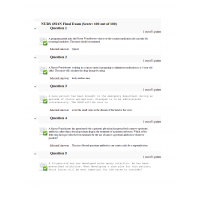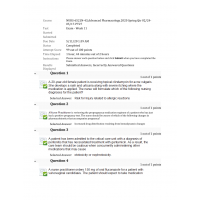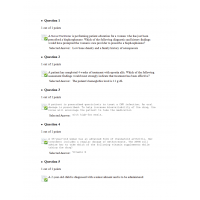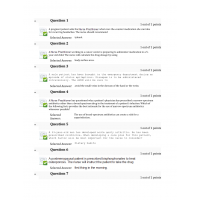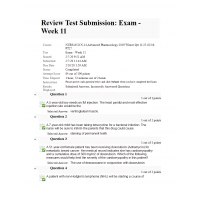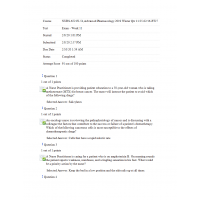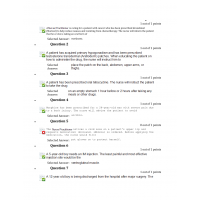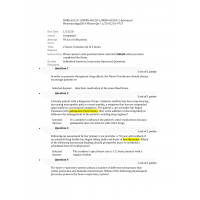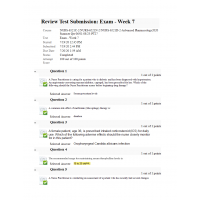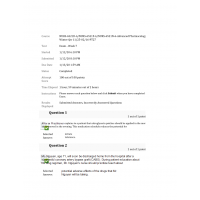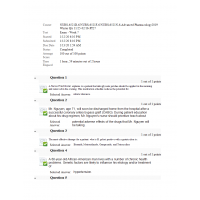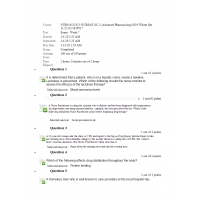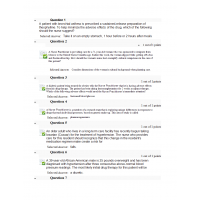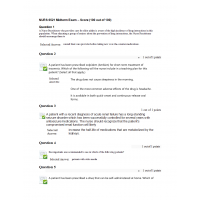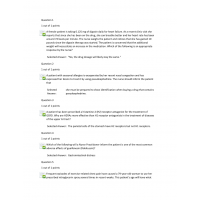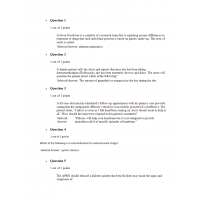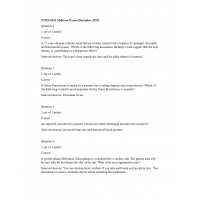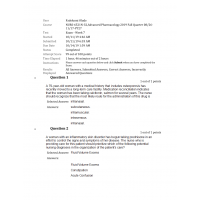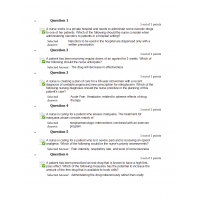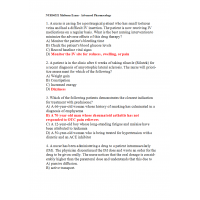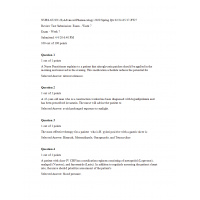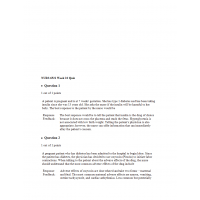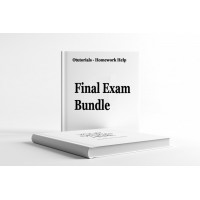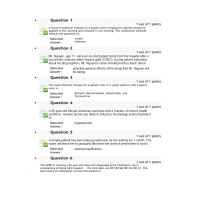NURS-6521,Advanced Pharmacology Exam - Week 7
Score: 100 out of 100
1. A physician has ordered subcutaneous injections of morphine, a narcotic, every 4 hours as needed for pain for a motor vehicle accident victim. The nurse is aware that there is a high abuse potential for this drug and that it is categorized as a
2. Glargine (Lantus) is an insulin analog that essentially has no peak and is usually administered:
3. A 47-year-old woman has been diagnosed with open-angle glaucoma. Pilocarpine drops are prescribed. The nurse's assessment reveals that the patient has worn soft contact lenses for 15 years. The nurse will instruct the patient to
4. A patient comes to the clinic asking for help to quit drinking alcohol. She has a 21-year history of heavy drinking and is worried about developing cirrhosis of the liver. The patient agrees to take disulfiram (Antabuse). The nurse will teach the patient that the combination of alcohol and Antabuse will cause which of the following?
5. Typical adverse reactions to oral calcium-channel blockers include:
6. Mr. Contreras is a 64-year-old patient with Type 2 diabetes. He has recently been diagnosed with hypertension. Which antihypertensive drug is the recommended choice to treat hypertension in patients with diabetes?
7. Mr. Johnson is an 80-year-old male who is on Digoxin therapy. The Nurse Practitioner knows they should monitor the older adult patient for which of the most common adverse reactions of digoxin?
8. Jillian is a Nurse Practitioner. She recognizes that Nurse Practitioner prescriptive authority Is regulated by:
9. A Nurse Practitioner is conducting an assessment of a patient who has recently had several changes made to her drug regimen. What assessment question most directly addresses the safety implications of the patient's drug regimen?
10. A female patient, age 36, is prescribed inhaled corticosteroid (ICS) for daily use. Which of the following adverse effects should the nurse closely monitor for in this patient?
11. A Nurse Practitioner is caring for a patient who is diabetic and has been diagnosed with hypertension. An angiotensin-converting enzyme inhibitor, captopril, has been prescribed for her. Which of the following should the Nurse Practitioner assess before beginning drug therapy?
12. A 76-year-old woman has a complex medical history that includes emphysema, osteoporosis, malnutrition, and hypothyroidism. Recently, the woman fell outside her home as a result of weakness and suffered a fracture to her femoral head. The woman's subsequent hip-replacement surgery has been scheduled and the care team recognizes that the use of isoflurane will be most significantly influenced by
13. A common side effect of metformin (Glucophage) therapy is:
14. A patient is admitted to the emergency department with severe chest pain. The emergency department physician orders intravenous nitroglycerin 5 mcg/min, titrate dose by 5 mcg/min every 3 to 5 minutes per infusion pump as needed. Before administering the nitroglycerin, the nurse should prioritize which of the following assessments?
15. In light of her recent high blood pressure readings, a patient has been started on a thiazide diuretic and metoprolol (Lopressor), which is a beta-adrenergic blocker. What is the most likely rationale for using two medications to address the patient's hypertension?
16. Which type of antihistamines are used to inhibit the secretion of gastric acid in patients with gastrointestinal disorders?
17. The recommended range for maintaining serum theophylline levels is:
18. The anticoagulant drug that acts as a vitamin K antagonist is:
19. A patient with a long history of alcohol abuse has been admitted to an acute medical unit with signs and symptoms of hepatic encephalopathy. His current medication orders include QID doses of oral lactulose. What desired outcomes should the nurse associate with this drug order?
20. A patient with a recent diagnosis of acute renal failure has a long-standing seizure disorder which has been successfully controlled for several years with antiseizure medications. The nurse should recognize that the patient's compromised renal function will likely
21. The point in time on the drug concentration curve that indicates the first sign of a therapeutic effect is the
22. Mr. Lastinger was prescribed warfarin sodium (Coumadin). You advise him to avoid eating large amounts of leafy green vegetables because:
23. Some first-generation antihistamines are used:
24. All of the following agents are used to control the inflammatory changes seen in the lungs of asthmatics except:
25. Which of the following oral medications is the safest to use during pregnancy?
26. Ginger, a 25 year old female presents at the clinic with known history of depression. She reports taking an SSRI with only partial relief. Which of the following drugs can be used safely at any dose in conjunction with an SSRI?
27. Jillian is a Nurse Practitioner. She recognizes that Nurse Practitioner prescriptive authority Is regulated by:
28. Biguanides control hyperglycemia in type 2 diabetes primarily by acting at which organ?
29. A 60-year-old African-American man lives with a number of chronic health problems. Genetic factors are likely to influence his etiology and/or treatment of
30. Metformin (Glucophage) acts by:
31. A Nurse Practitioner is discussing with a patient the efficacy of a drug that his physician has suggested, and he begin taking. Efficacy of a drug means which of the following?
32. The Elderly are at high risk of Adverse Drug Reactions due to:
33. A 34-year-old male patient is prescribed methimazole (MMI). The Nurse Practitioner will advise him to report which of the following immediately?
34. A 72-year-old man is taking Adderall XR for the treatment of narcolepsy. He is currently having problems with not being able to swallow large tablets or capsules. The man also wears dentures, which makes it even more difficult for him to swallow medication. He is in the clinic to talk to the nurse about his problem. The nurse will instruct him to
35. A patient in need of myocardial infarction prophylaxis has been prescribed sulfinpyrazone for gout. Which of the following will the nurse monitor the patient most closely for?
36. A female patient is taking 0.125 mg of digoxin daily for heart failure. At a recent clinic visit she reports that since she has been on the drug, she can breathe better and her heart rate has been around 74 beats per minute. The nurse weighs the patient and notices that she has gained 10 pounds since the digoxin therapy was started. The patient is concerned that the additional weight will necessitate an increase in the medication. Which of the following is an appropriate response by the nurse?
37. During a clinic visit, a patient complains of having frequent muscle cramps in her legs. The nurse's assessment reveals that the patient has been taking over-the-counter laxatives for the past 7 years. The nurse informed the patient that prolonged use of laxatives
38. Which of the following statements best defines how a chemical becomes termed a drug?
39. You are seeing a 65 year old male with a long history of COPD who has recently developed hypertension. Which class of antihypertensive agents should the Nurse Practitioner avoid for this patient?
40. A 53-year-old man has been treated for severe asthma for several years with prednisone. Recently, his physician initiated alternate-day therapy for him. The patient tells the nurse that he would rather take the medication every day to prevent confusion. Which of the following would be the best response by the nurse?
41. A male patient who is hypertensive takes Hydrochlorothiazide for his blood pressure . He presents with red, painful swelling of the great toe. In addition to treating gout, you recognize that you may need to:
42. A mother brings her 4-year-old child, who is vomiting and has a temperature of 103°F into the emergency department (ED). The ED physician orders acetaminophen (Tylenol) for the fever. The best form of Tylenol to give the child, considering her presentation, would be
43. Ms. Simpson has a known history of asthma. She is on Theophylline daily. The NP contemplates giving her an antibiotic for her respiratory infection. The NP knows that which choice below could elevate theophylline levels?
44. A 58-year-old man is prescribed dicyclomine (Bentyl) for irritable bowel syndrome. In which of the following conditions is dicyclomine therapy contraindicated?
45. A patient who is a steroid-dependent asthmatic is started on a beclomethasone inhaler. Which should be part of patient education?
46. A Nurse Practitioner is providing care for a patient who suffered extensive burns to his extremities during a recent industrial accident. Topical lidocaine gel has been ordered to be applied to the surfaces of all his burns in order to achieve adequate pain control. When considering this order, the Nurse Practitioner should be aware that
47. During a clinic visit, a patient complains of having frequent muscle cramps in her legs. The nurse's assessment reveals that the patient has been taking over-the-counter laxatives for the past 7 years. The nurse informed the patient that prolonged use of laxatives
48. Which antihypertensive agent is associated with hair growth?
49. A Nurse Practitioner is discussing with a patient the efficacy of a drug that his physician has suggested, and he begin taking. Efficacy of a drug means which of the following?
50. A diabetic patient being treated for obesity tells the Nurse Practitioner that he is having adverse effects from his drug therapy. The patient has been taking dextroamphetamine for 2 weeks as adjunct therapy. Which of the following adverse effects would need the Nurse Practitioner's immediate attention?
51. Which can elevate theophylline levels?
52. A patient on valproic acid may experience which of the following symptoms?
53. What information would the Nurse Practitioner include in teaching a patient about the treatment of vitamin B12 deficiency following a total gastrectomy?
54. The Nurse Practitioner is following up on a patient who is experiencing acute asthma problems. Albuterol (Proventil) by metered-dose inhaler (MDI) has been ordered as treatment. Which patient response would indicate to the family nurse practitioner that the patient understands how to take the medication?
55. Some first-generation antihistamines are used:
56. The NP knows that lithium levels should be measured while patients are on lithium therapy. The NP also recognizes that lithium has a
57. Mr. Penny, age 67, was diagnosed with chronic angina several months ago and has been unable to experience adequate relief of his symptoms. As a result, his physician has prescribed ranolazine (Ranexa). Which of the following statements is true regarding the use of ranolazine for the treatment of this patient's angina?
58. A physician has ordered subcutaneous injections of morphine, a narcotic, every 4 hours as needed for pain for a motor vehicle accident victim. The nurse is aware that there is a high abuse potential for this drug and that it is categorized as a
59. A primary therapy for patients with mild ulcerative colitis is:
60. Which of the following conditions is a contraindication for pioglitazone (Actos).
61. A male patient is to begin glyburide (Diabeta) for type 2 diabetes. Before the drug therapy begins, a priority action by the nurse will be to assess the patient's
62. A 62-year-old man is admitted to the hospital with a diagnosis of chest pain. He has an order for 0.3 mg of sublingual nitroglycerin prn for chest pain. Which of the following actions should the nurse do first when he complains of chest pain?
63. Glucocorticoids affect the metabolism of carbohydrates, protein, and fats.
64. A Nurse Practitioner is providing discharge planning for a 45-year-old woman who has a prescription for oral albuterol. The Nurse Practitioner will question the patient about her intake of which of the following?
65. The Family nurse practitioner prescribed losartan 50 mg PO daily for a hypertensive patient. This medication promotes vasodilation by:
66. When prescribing an antihypertensive medication for a type 2 diabetic patient, the drug classifications that would tend to reduce insulin sensitivity are:
67. The point in time on the drug concentration curve that indicates the first sign of a therapeutic effect is the
68. A Nurse Practitioner is providing discharge planning for a 45-year-old woman who has a prescription for oral albuterol. The Nurse Practitioner will question the patient about her intake of which of the following?
69. Which of the following serves to protect the public by ensuring the purity of a drug and its contents?
70. What is associated with chronic overtreatment with levothyroxine (Synthroid)?
71. Drugs that use CYP 3A4 isoenzymes for metabolism may:
72. A male patient is to begin glyburide (Diabeta) for type 2 diabetes. Before the drug therapy begins, a priority action by the nurse will be to assess the patient's
73. The parents of a 7-year-old boy who has just been diagnosed with allergic asthma are being taught about their son's medication regimen by the nurse. The nurse is currently teaching the parent's about the appropriate use of a "rescue drug" for acute exacerbations of their son's asthma. What drug should the nurse suggests the parents to use in these situations?
74. In order to promote therapeutic drug effects, the Nurse Practitioner should always encourage patients to
75. How does cholestyramine lowers blood cholesterol?
76. Topical inhaled alpha adrenergic blocking agents or nasal vasoconstricting decongestants should not be used chronically (>5 days) because they can cause
77. A Nurse Practitioner who provides care in a busy clinic is aware of the high incidence and prevalence of hyperlipidemia and the consequent need for antihyperlipidemics in many patients. Treatment of high cholesterol using statins would be contraindicated in which of the following patients?
78. Which mechanism of platelet inhibition is exhibited by aspirin?
79. Advanced practice nurse prescribing of scheduled medications is affected most by:
80. A female patient, age 36, is prescribed inhaled corticosteroid (ICS) for daily use. Which of the following adverse effects should the nurse closely monitor for in this patient?
81. A patient has a history of tonic-clonic seizures that have been successfully treated with phenytoin (Dilantin) for several years. Phenytoin achieves a therapeutic effect by
82. A female patient is taking 0.125 mg of digoxin daily for heart failure. At a recent clinic visit she reports that since she has been on the drug, she can breathe better and her heart rate has been around 74 beats per minute. The nurse weighs the patient and notices that she has gained 10 pounds since the digoxin therapy was started. The patient is concerned that the additional weight will necessitate an increase in the medication. Which of the following is an appropriate response by the nurse?
83. Which of the following can block the action of heparin?
84. You decide to start your pt, Ms. Rodrigues, on spironolactone (Aldactone) 50 mg PO daily. As the NP, you will instruct the patient to call the clinic if which symptoms are experienced?
85. The nurse practitioner has prescribed elemental iron 6 mg/kg/day in three divided doses for a toddler diagnosed with iron-deficiency anemia. What instructions would the family nurse practitioner include for the parents?
86. Your patient is on Atorvastatin 40 mg daily, and presents for their routine follow up appointment. They complain of extreme fatigue, muscle aches, and dark colored urine. What is your best course of action given presentation?
87. Mr. Lastinger was prescribed warfarin sodium (Coumadin). You advise him to avoid eating large amounts of leafy green vegetables because:
88. A Nurse Practitioner is caring for a 73-year-old man who is receiving drug therapy. He is beginning to exhibit signs of decline in his renal system, yet his current serum creatinine level is normal. The Nurse Practitioner will base the patient's plan of care on the understanding that there is
89. Typical adverse reactions to oral calcium-channel blockers include:
90. What drug class will decrease the facial flushing that occurs with niacin?
91. A 66-year-old woman has a complex medical history that includes poorly-controlled type 1 diabetes, renal failure as a result of diabetic nephropathy and chronic heart failure (CHF). Her care provider has recently added spironolactone (Aldactone) to the woman's medication regimen. The nurse should consequently assess for signs and symptoms of
92. A clinic Nurse Practitioner is planning care for a 68-year-old man who has been on omeprazole (Prilosec) therapy for heartburn for some time. Regarding the patient's safety, which of the following would be a priority nursing action?
93. A patient with a known history of benign prostatic hyperplasia (BPH) presents to the clinic 4 days after developing a cold. He tells you he began experiencing a sore throat and nasal congestion and began to take an over-the-counter decongestant. Today, he complains of not urinating over the last 12 hours. He also has suprapubic fullness on exam. Which of the following medications are most likely responsible for this patient's urinary retention?
94. Which of the following is a side effect or precaution associated with ACE inhibitors?
95. Some first generation antihistamines are used:
96. What is a serious side effect of ibuprofen in the older adult patient?
97. A 53-year-old man has been treated for severe asthma for several years with prednisone. Recently, his physician initiated alternate-day therapy for him. The patient tells the nurse that he would rather take the medication every day to prevent confusion. Which of the following would be the best response by the nurse?
98. A patient comes to the clinic asking for help to quit drinking alcohol. She has a 21-year history of heavy drinking and is worried about developing cirrhosis of the liver. The patient agrees to take disulfiram (Antabuse). The nurse will teach the patient that the combination of alcohol and Antabuse will cause which of the following?
99. A clinic Nurse Practitioner is planning care for a 68-year-old man who has been on omeprazole (Prilosec) therapy for heartburn for some time. Regarding the patient's safety, which of the following would be a priority nursing action?
100. Acetazolamide is categorized as which of the following?
| Institution & Term/Date | |
| Term/Date | Walden University |
NURS 6521N Midterm Exam 2 with Answers - (100 out of 100)
- Product Code: 2020
- Availability: In Stock
-
$30.00
Related Products
Tags: NURS 6521

